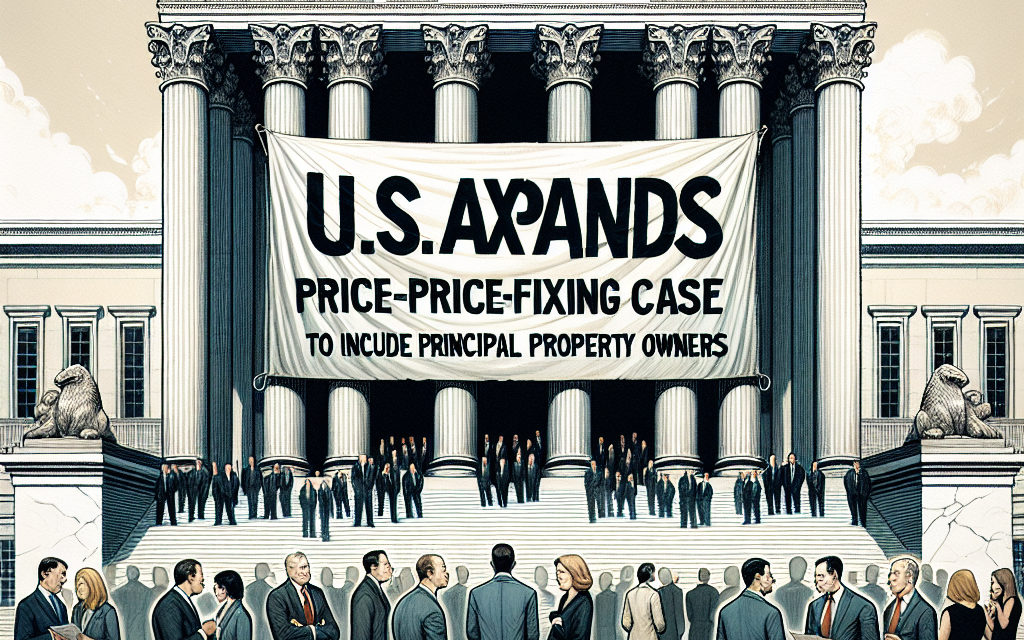“U.S. Expands RealPage Price-Fixing Investigation to Six Major Landlords: Holding the Housing Market Accountable.”
Introduction
The U.S. Department of Justice has expanded its investigation into alleged price-fixing practices involving RealPage, a property management software company, by targeting six major landlords. This development highlights concerns over collusion in the rental market, where these landlords are accused of coordinating pricing strategies that could inflate rents and limit competition. The case underscores the growing scrutiny of corporate practices in the real estate sector and aims to ensure fair market conditions for tenants across the country.
RealPage Price-Fixing Allegations
In a significant development within the realm of real estate and property management, the U.S. Department of Justice (DOJ) has expanded its investigation into alleged price-fixing practices involving RealPage, a prominent software provider for the multifamily housing sector. This expansion now targets six major landlords, raising serious concerns about anti-competitive behavior in the rental market. The allegations suggest that these landlords, in collaboration with RealPage, may have engaged in practices that artificially inflated rental prices, thereby impacting millions of tenants across the nation.
The core of the allegations revolves around the use of RealPage’s pricing software, which is designed to assist landlords in setting rental rates based on market data and demand fluctuations. However, the DOJ contends that this software may have facilitated collusion among landlords, allowing them to coordinate pricing strategies rather than competing against one another. This alleged collusion not only undermines the principles of a free market but also places an undue financial burden on renters, who are already grappling with rising housing costs.
As the investigation unfolds, it has become evident that the implications of these practices extend beyond individual landlords and RealPage itself. The broader multifamily housing market could be affected, as the potential for coordinated pricing strategies may lead to a homogenization of rental rates across different regions. This scenario could stifle competition, limit choices for consumers, and ultimately contribute to the ongoing affordability crisis in housing. The DOJ’s decision to broaden its inquiry reflects a growing recognition of the need to scrutinize the practices of major players in the real estate sector, particularly in light of the increasing concentration of market power among a few large landlords.
Moreover, the involvement of six major landlords in this investigation highlights the interconnectedness of the real estate industry and the potential for systemic issues that can arise when a handful of companies dominate the market. These landlords, who collectively manage thousands of rental units, wield significant influence over rental prices and housing availability. Consequently, their actions can have far-reaching effects on local economies and communities, making it imperative for regulatory bodies to ensure that competitive practices are upheld.
In response to these allegations, the landlords involved have publicly denied any wrongdoing, asserting that their pricing strategies are based on legitimate market analysis rather than collusion. However, the DOJ’s investigation is likely to delve deeper into the practices and communications of these companies, seeking to uncover any evidence of coordinated efforts to manipulate rental prices. As the case progresses, it will be crucial for the DOJ to establish a clear link between the use of RealPage’s software and the alleged price-fixing activities.
The outcome of this investigation could set a precedent for how technology companies and landlords interact in the multifamily housing market. If the allegations are substantiated, it may lead to increased regulatory scrutiny and potential reforms aimed at promoting fair competition. Furthermore, it could encourage other jurisdictions to examine similar practices within their own rental markets, fostering a more equitable environment for tenants.
In conclusion, the expansion of the RealPage price-fixing case to include six major landlords underscores the importance of maintaining competitive practices in the real estate sector. As the DOJ continues its investigation, the implications for both landlords and tenants will be closely monitored, with the potential for significant changes in how rental prices are determined and regulated in the future.
Impact on Major Landlords
The recent expansion of the RealPage price-fixing case to include six major landlords marks a significant development in the ongoing scrutiny of rental market practices in the United States. This legal action not only highlights the potential collusion among prominent players in the real estate sector but also raises critical questions about the broader implications for the rental market and its stakeholders. As the case unfolds, the impact on these major landlords could be profound, affecting their operational strategies, financial performance, and public perception.
To begin with, the inclusion of these landlords in the price-fixing allegations suggests a potential shift in the competitive landscape of the rental market. If found guilty, these companies may face substantial fines and legal repercussions, which could lead to a reevaluation of their pricing strategies. The financial burden of penalties could compel these landlords to adjust their rental rates, potentially leading to increased costs for tenants. Consequently, this could create a ripple effect throughout the rental market, as other landlords may feel pressured to follow suit, thereby exacerbating affordability issues for renters.
Moreover, the reputational damage associated with being implicated in price-fixing can have lasting effects on these major landlords. In an era where corporate transparency and ethical practices are increasingly scrutinized, public trust is paramount. If these companies are perceived as engaging in anti-competitive behavior, they may face backlash from tenants, advocacy groups, and the general public. This erosion of trust could lead to decreased occupancy rates, as potential renters may choose to avoid properties associated with unethical practices. In turn, this could impact the landlords’ bottom lines, as vacancies translate to lost revenue.
In addition to financial and reputational consequences, the case may also prompt regulatory changes within the rental market. As the government investigates these allegations, there may be a push for stricter regulations governing pricing practices among landlords. This could lead to increased oversight and accountability, fundamentally altering how landlords operate. For instance, if new regulations are implemented to prevent collusion and ensure fair pricing, landlords may need to invest in compliance measures, further straining their resources.
Furthermore, the case could catalyze a broader conversation about the role of technology in the rental market. RealPage, the company at the center of the allegations, provides software solutions that facilitate pricing strategies for landlords. As the investigation progresses, it may prompt landlords to reassess their reliance on such technology and the ethical implications of using algorithms to set rental prices. This introspection could lead to a shift towards more transparent and equitable pricing models, ultimately benefiting tenants.
As the legal proceedings continue, the impact on these major landlords will likely evolve. The outcome of the case could set a precedent for how price-fixing allegations are handled in the future, influencing not only the involved parties but also the entire rental market. In this context, landlords must navigate the complexities of legal challenges while also considering the potential long-term effects on their business practices and relationships with tenants.
In conclusion, the broadening of the RealPage price-fixing case to target six major landlords signifies a pivotal moment in the rental market. The implications of this case extend beyond immediate legal consequences, affecting financial performance, public perception, and regulatory frameworks. As stakeholders closely monitor the developments, the outcome may reshape the landscape of rental practices in the United States, emphasizing the need for ethical conduct and transparency in the industry.
Legal Ramifications for RealPage
The recent expansion of the RealPage price-fixing case to include six major landlords marks a significant development in the ongoing legal scrutiny surrounding the property management software company. This case, which initially focused on RealPage’s pricing practices, has now evolved to encompass broader implications for the real estate industry, particularly concerning antitrust laws and competitive practices. As the U.S. government intensifies its investigation, the legal ramifications for RealPage and its associated landlords could be profound, potentially reshaping the landscape of rental pricing and property management.
At the heart of the allegations is the assertion that RealPage facilitated collusion among landlords to set rental prices artificially high, thereby undermining market competition. This practice, if proven, could violate antitrust laws designed to promote fair competition and protect consumers from monopolistic behaviors. The inclusion of major landlords in the case suggests that the government is not only targeting RealPage but is also scrutinizing the broader network of entities that may have participated in or benefited from these alleged practices. Consequently, this could lead to a reevaluation of how rental prices are determined across the nation, impacting both landlords and tenants alike.
As the case unfolds, the potential for significant financial penalties looms large for RealPage and the implicated landlords. If found guilty of price-fixing, these entities could face hefty fines, which would serve as a deterrent against future violations. Moreover, the reputational damage associated with such allegations could have lasting effects on their business operations. Landlords may find themselves under increased scrutiny from both regulators and the public, leading to a potential loss of tenant trust and a decline in occupancy rates. This situation underscores the importance of compliance with antitrust regulations, as the consequences of non-compliance can extend far beyond financial penalties.
In addition to financial repercussions, the case may also prompt changes in corporate governance and operational practices within RealPage and the implicated landlords. Companies may be compelled to reassess their pricing strategies and ensure that they are in alignment with legal standards. This could involve implementing more transparent pricing mechanisms and enhancing compliance training for employees to mitigate the risk of future violations. Furthermore, the case may encourage other landlords to adopt more competitive pricing strategies, fostering a healthier rental market that benefits consumers.
The legal ramifications of this case extend beyond the immediate parties involved; they may also influence legislative discussions surrounding antitrust laws and regulations in the real estate sector. As the government seeks to address perceived inequities in the housing market, this case could serve as a catalyst for broader reforms aimed at promoting fair competition. Policymakers may consider introducing new regulations or enhancing existing ones to prevent similar practices in the future, thereby ensuring that the rental market remains accessible and equitable for all.
In conclusion, the broadening of the RealPage price-fixing case to include six major landlords signifies a pivotal moment in the intersection of technology, real estate, and antitrust law. As the legal proceedings progress, the implications for RealPage and its associates will likely reverberate throughout the industry, prompting a reevaluation of pricing practices and compliance measures. Ultimately, this case serves as a reminder of the critical importance of maintaining competitive integrity in the marketplace, ensuring that both landlords and tenants can navigate the rental landscape fairly and transparently.
Tenant Rights and Price-Fixing
In recent developments, the U.S. government has expanded its investigation into alleged price-fixing practices within the rental housing market, specifically targeting six major landlords associated with RealPage, a property management software company. This case has significant implications for tenant rights, as it highlights the potential for collusion among landlords that can lead to inflated rental prices and reduced housing affordability. The investigation raises critical questions about the ethical responsibilities of landlords and the broader impact of their business practices on tenants.
Price-fixing, a practice where companies conspire to set prices at a certain level rather than allowing market forces to dictate them, can severely undermine the principles of a free market. In the context of rental housing, such practices can lead to artificially high rents, making it increasingly difficult for tenants to find affordable housing options. As the investigation unfolds, it becomes evident that the actions of these landlords may not only violate antitrust laws but also infringe upon the rights of tenants who are seeking fair and reasonable rental agreements.
The implications of this case extend beyond the immediate financial impact on tenants. When landlords engage in price-fixing, they create an environment where competition is stifled, and tenants are left with limited choices. This lack of competition can lead to a deterioration in the quality of rental properties, as landlords may feel less pressure to maintain or improve their units when they are not competing for tenants. Consequently, tenants may find themselves trapped in subpar living conditions, with little recourse to address their grievances.
Moreover, the expansion of the RealPage case underscores the importance of regulatory oversight in the rental market. As the government investigates these practices, it serves as a reminder of the need for robust tenant protections and the enforcement of fair housing laws. Tenants must be aware of their rights and the mechanisms available to them to report unfair practices. Advocacy groups play a crucial role in educating tenants about their rights and providing resources to help them navigate disputes with landlords.
In light of these developments, it is essential for tenants to remain vigilant and informed about the rental market dynamics. Understanding the potential for price-fixing and its implications can empower tenants to advocate for themselves and seek fair treatment. Additionally, as public awareness of these issues grows, there may be increased pressure on lawmakers to implement reforms that promote transparency and accountability within the rental housing sector.
As the investigation into the six major landlords continues, it is crucial for tenants to engage in discussions about housing affordability and their rights. The outcome of this case could set a precedent for how rental markets are regulated and how landlords are held accountable for their actions. Ultimately, the fight against price-fixing is not just about financial restitution; it is about ensuring that all tenants have access to safe, affordable housing without the burden of inflated rents caused by unethical business practices.
In conclusion, the broadening of the RealPage price-fixing case serves as a pivotal moment in the ongoing struggle for tenant rights. It highlights the need for vigilance against collusion in the rental market and reinforces the importance of regulatory frameworks that protect tenants from exploitative practices. As this case unfolds, it is imperative for tenants to remain informed and engaged, advocating for their rights and contributing to a more equitable housing landscape.
Market Implications of the Case
The recent expansion of the RealPage price-fixing case to include six major landlords has significant implications for the multifamily housing market in the United States. As the government intensifies its scrutiny of potential collusion among these prominent players, the ripple effects are likely to be felt across various sectors of the real estate industry. This development raises critical questions about pricing strategies, market competition, and the overall health of the rental market.
To begin with, the involvement of major landlords in this case suggests a potential shift in how rental prices are determined. Traditionally, rental rates have been influenced by a variety of factors, including location, amenities, and market demand. However, if collusion is proven, it could indicate that these landlords have been artificially inflating prices, thereby undermining the principles of a competitive market. This revelation may lead to increased scrutiny from regulators and could prompt a reevaluation of pricing practices across the industry. Consequently, landlords may need to adopt more transparent pricing strategies to avoid legal repercussions and maintain their reputations.
Moreover, the case could have a chilling effect on investor confidence in the multifamily housing sector. Investors typically seek stability and predictability in their portfolios, and allegations of price-fixing can introduce uncertainty. If the case results in significant penalties or changes in operational practices for the implicated landlords, it may deter potential investors from entering the market or lead existing investors to reconsider their positions. This shift in sentiment could ultimately impact property valuations and the availability of capital for new developments, thereby slowing the growth of the multifamily housing sector.
In addition to investor concerns, the case may also influence tenant behavior. As awareness of the allegations spreads, renters may become more vigilant about their rights and pricing practices. This heightened awareness could lead to increased demand for transparency in rental agreements and pricing structures. Tenants may begin to question the fairness of their rental rates, prompting them to seek alternatives or negotiate more aggressively with landlords. Such a shift in tenant behavior could further complicate the dynamics of the rental market, as landlords may find themselves under pressure to justify their pricing.
Furthermore, the broader implications of this case extend to regulatory bodies and policymakers. The government’s decision to broaden the investigation signals a commitment to enforcing antitrust laws within the housing sector. This could lead to more stringent regulations aimed at preventing collusion and promoting fair competition. As a result, landlords may need to adapt to a more regulated environment, which could involve changes in how they operate and interact with one another. This regulatory shift could also encourage smaller landlords and new entrants to the market, fostering a more competitive landscape that benefits tenants.
In conclusion, the expansion of the RealPage price-fixing case to target six major landlords is poised to reshape the multifamily housing market in the United States. The potential for increased regulatory scrutiny, shifts in investor confidence, and changes in tenant behavior all point to a transformative period for the industry. As stakeholders navigate this evolving landscape, the emphasis on transparency and fair competition will likely become paramount, ultimately influencing how rental prices are set and how the market functions as a whole. The outcome of this case will not only impact the implicated landlords but could also set a precedent for the future of rental housing in the country.
Responses from Affected Landlords
In the wake of the U.S. government’s decision to broaden its investigation into alleged price-fixing practices involving RealPage, a significant response has emerged from the six major landlords implicated in the case. These landlords, who collectively manage a substantial portion of the rental market, have expressed their concerns regarding the allegations and the potential ramifications for their businesses. As the investigation unfolds, their responses reflect a mix of denial, caution, and a commitment to compliance with legal standards.
Initially, several landlords have categorically denied any wrongdoing, asserting that their pricing strategies are based on market conditions rather than collusion. They emphasize that their pricing models are designed to remain competitive and responsive to the dynamics of supply and demand in the rental market. This assertion is crucial, as it underscores their position that any similarities in pricing are coincidental rather than the result of coordinated efforts. By framing their responses in this manner, these landlords aim to distance themselves from the allegations and maintain their reputations in an increasingly scrutinized industry.
Moreover, some landlords have highlighted their commitment to transparency and ethical business practices. They argue that their operations are guided by a strong adherence to legal and regulatory frameworks, which they believe will ultimately vindicate them in the ongoing investigation. This emphasis on compliance is particularly important in an environment where public trust is paramount, especially in the wake of rising rental prices and housing affordability concerns. By positioning themselves as responsible corporate citizens, these landlords seek to reassure tenants and stakeholders that they are not engaged in any illicit activities.
In addition to denying the allegations, some landlords have expressed concern about the broader implications of the investigation for the rental market. They argue that the scrutiny surrounding the case could lead to increased regulatory burdens and a chilling effect on business practices within the industry. This concern is particularly relevant given the current economic climate, where many landlords are already grappling with rising operational costs and shifting tenant demands. The potential for heightened regulation could exacerbate these challenges, leading to unintended consequences for both landlords and tenants alike.
Furthermore, as the investigation progresses, some landlords have indicated a willingness to cooperate with authorities to clarify their business practices. This cooperative stance reflects an understanding that transparency may be essential in dispelling any misconceptions about their operations. By engaging with regulators and providing necessary documentation, these landlords hope to demonstrate their commitment to fair competition and ethical conduct. This proactive approach may also serve to mitigate any potential fallout from the investigation, as it positions them as willing participants in the pursuit of accountability.
As the situation continues to evolve, it is clear that the responses from affected landlords will play a critical role in shaping public perception and the future of the rental market. Their denials, commitments to compliance, and willingness to cooperate with authorities will be closely scrutinized by both regulators and the public. Ultimately, the outcome of the investigation may not only impact the landlords involved but could also set important precedents for the industry as a whole. As stakeholders await further developments, the interplay between regulatory scrutiny and market dynamics will undoubtedly remain a focal point of discussion in the coming months.
Future of Real Estate Technology Regulations
The recent expansion of the RealPage price-fixing case to include six major landlords marks a significant moment in the intersection of real estate and technology regulation. As the U.S. government intensifies its scrutiny of the practices within the real estate technology sector, it raises critical questions about the future of regulatory frameworks that govern this rapidly evolving industry. The implications of this case extend beyond the immediate legal ramifications for the involved parties; they signal a potential shift in how technology companies operating in the real estate space will be monitored and held accountable.
Historically, the real estate sector has been characterized by a complex web of relationships among landlords, property management firms, and technology providers. The advent of sophisticated software solutions, such as those offered by RealPage, has transformed how landlords manage their properties, optimize pricing, and interact with tenants. However, as these technologies become more integrated into the fabric of real estate operations, concerns about anti-competitive practices have emerged. The allegations against RealPage suggest that its pricing algorithms may have facilitated collusion among landlords, leading to inflated rental prices and reduced market competition.
In light of these developments, regulatory bodies are likely to adopt a more proactive stance toward overseeing the practices of real estate technology firms. This shift may involve the implementation of stricter guidelines and compliance measures aimed at preventing anti-competitive behavior. As the government investigates the extent of the alleged price-fixing, it is essential to consider how these regulations will impact innovation within the industry. Striking a balance between fostering technological advancement and ensuring fair market practices will be a critical challenge for regulators.
Moreover, the case against RealPage serves as a cautionary tale for other technology providers in the real estate sector. Companies that rely on data-driven algorithms to set pricing or manage tenant relationships must be vigilant in ensuring that their practices comply with antitrust laws. As the legal landscape evolves, firms may need to invest in compliance programs and legal counsel to navigate the complexities of regulatory requirements. This increased focus on compliance could lead to a more transparent and ethical business environment, ultimately benefiting consumers and fostering trust in the industry.
As the investigation unfolds, it is also important to consider the broader implications for tenants and the housing market. If the allegations are proven true, the consequences could be far-reaching, potentially leading to lower rental prices and increased availability of affordable housing. Conversely, if the case results in a tightening of regulations that stifles innovation, it could hinder the development of new technologies that improve the rental experience for tenants. Therefore, the outcome of this case will likely influence not only the involved parties but also the overall trajectory of the real estate technology landscape.
In conclusion, the expansion of the RealPage price-fixing case to include major landlords underscores the urgent need for a reevaluation of regulatory practices within the real estate technology sector. As the government seeks to address potential anti-competitive behavior, stakeholders must remain vigilant and adaptable to the changing regulatory environment. The future of real estate technology regulations will undoubtedly shape the industry’s landscape, influencing how companies operate and how consumers experience the rental market. Ultimately, the balance between innovation and regulation will be crucial in determining the long-term health and sustainability of the real estate sector.
Q&A
1. **What is the RealPage price-fixing case about?**
The RealPage price-fixing case involves allegations that the property management software company RealPage facilitated collusion among landlords to fix rental prices, leading to inflated rents.
2. **Who are the six major landlords targeted in the case?**
The six major landlords include some of the largest property management companies in the U.S., although specific names may vary based on the latest developments in the case.
3. **What actions have been taken by the U.S. government regarding this case?**
The U.S. government has expanded its investigation to include these six major landlords, potentially leading to legal action against them for their involvement in price-fixing practices.
4. **What are the potential consequences for the landlords involved?**
The landlords could face significant fines, legal penalties, and potential changes to their business practices if found guilty of collusion.
5. **How does RealPage’s software allegedly contribute to price-fixing?**
RealPage’s software allegedly allows landlords to analyze rental market data and set prices in a way that encourages collusion rather than competitive pricing.
6. **What impact could this case have on the rental market?**
If the case leads to significant penalties or changes in practices, it could result in lower rental prices and increased competition in the rental market.
7. **What is the current status of the case?**
As of the latest updates, the investigation is ongoing, with the U.S. government actively pursuing evidence and building its case against the involved landlords.
Conclusion
The U.S. has expanded its investigation into the RealPage price-fixing case by targeting six major landlords, highlighting concerns over anti-competitive practices in the rental market. This move underscores the government’s commitment to addressing potential collusion among large property management firms that may be manipulating rental prices, ultimately aiming to promote fair competition and protect consumers from inflated housing costs. The outcome of this case could have significant implications for the real estate industry and regulatory practices moving forward.





